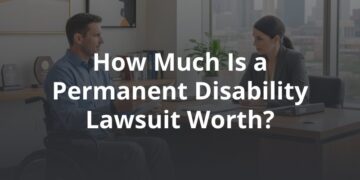Fewer experiences are scarier than realizing — whether in the throes of the collision itself or after waking up in a hospital bed — that you have been the victim of a drunk driving crash.
In 2019, 886 people in Texas were killed in the over 24,000 crashes that involved a legally intoxicated driver. These numbers remain roughly constant from year to year in our state. Many victims choose to exercise the rights of recovery afforded to them by the state by connecting with a drunk driving accident lawyer and filing a lawsuit.
Considering the specific ways that financial compensation for being a victim of a drunk driver can seem impersonal, but it is important. The amount of damages awarded in injury cases is impacted by what are known as value drivers, or factors that add value to your case. Both the insurance companies involved in your case and your attorneys will be considering these value drivers.
We know we can’t take away the trauma and pain of being injured by a drunk driver, but we hope the following information about drunk driving collision case damages will reduce some of the uncertainty you might be feeling.
How Do Insurance Companies Determine How Much to Offer for Drunk Driving Settlements?
Drunk driving accident cases are especially traumatic because of the high damages and extensive physical injuries that often occur, the sheer recklessness of the behavior, and the knowledge that the accident was entirely preventable. The additional impact of ongoing criminal proceedings can make the experience even more devastating.
Just as no two accidents are the same, no two financial retribution amounts awarded to the victims will be the same. However, we can help you understand a few of the factors that insurance companies — and your attorneys — will take into account when settling your drunk driving accident claim.
In any accident claim, insurance companies are going to consider:
- Who is at fault. Texas is a tort state, which means that the insurance company of the at-fault driver is responsible for the costs associated with the incident. In drunk driving crashes, it is not a far stretch to say the legally intoxicated driver is at fault for the accident, but it is still crucial for all victims — including other drivers, passengers, pedestrians, and cyclists — to file a claim with the insurance company as soon as possible.
- Who is insured. In some cases, you may not be sure what insurance coverage the vehicle or driver involved in the crash has — or whether they are even insured. Your own insurance company has staff whose job it is to find out this information, even if you do not have uninsured motorist coverage.
- How fast they can settle. Not uncommonly, the at-fault driver’s insurance company will want you to settle quickly and sign a release of liability. Often, these initial offers are made by adjusters who are trained to obtain releases from victims for the lowest possible amount. The quicker they can close your claim, the less they have to worry about future costs associated with it, from your negotiations to the cost of staffing it.
- What Colossus says. Dozens of insurance companies use claims adjusting software, such as Colossus, Injury IQ, and Decision Point, to value claims and determine what is beneficial for them to pay out. Colossus has over 10,000 value drivers, which is often a disadvantage to claimants. Of these codes, only 600 of them are injury codes, and the remaining value drivers are considered “factors,” which remain unclear even to most adjusters themselves. If the proper documentation — especially from your medical providers — is not available, your case will almost certainly be devalued by the insurance company.
- What the driver’s behavior shows. Another factor that can have an impact on the value of a case, whether it’s a settlement or verdict amount, is the drunk driver’s history of other crimes, as well as their conduct after the crash. The driver’s post-incident conduct is something the jury can consider in developing a punitive damages award, so if the driver who hit you ignores their probation responsibilities or gets arrested again, it can increase your case’s value.
Generally speaking, the greater the extent of the injuries, the greater all other factors will be, especially the length of recovery, cost of medical expenses, amount of lost earnings, and extent of pain and suffering. Whether the insurance company uses evaluation software in the valuation of your claim or simply relies on a formula to calculate damages, the fact remains that no matter how compassionate the adjustor, the insurance company itself is a for-profit business whose primary interest is itself.
Sometimes, you may decide a settlement is in your best interests. But being well informed when you enter into the negotiations process with an insurance company is the best way to make sure that you secure a positive outcome.
How Will Your Attorneys Determine the Value of Your Case?
If you decide to hire an attorney, they will start by using a similar method of calculating the value of your claim to the insurance company’s: your attorney will still consider the impact of value drivers on your case.
However, when calculating the amount of damages to seek in your case, your attorneys may dig deeper and consider additional contextual factors, such as the:
- Extent of injuries, including any fatalities
- Length of recovery from injuries;
- Cost of current and future medical expenses
- Amount of current and future lost earnings
- Pain and suffering caused by the accident
- Strength of evidence against the driver
- Driver’s purpose for being on the road
- Location of the alcohol consumption
- Presence of any comparative fault factors
Some of the above factors can be divided into two distinct categories of compensatory awards: economic and non-economic harms and losses. However, by exploring the circumstances surrounding your accident, your attorney will be able to determine what secondary factors might impact the amount of damages received.
What Factors Increase or Decrease Your Settlement Award?
Aside from the specific value drivers related to compensatory damages, there are other factors involved in drunk driving accidents. These factors can impact the amount of your settlement award in either direction.
Some of the factors that can increase the amount of your settlement award are the:
- Strength of a Punitive Damages Claim
In Texas, the law opens the door for punitive damages, which are designed to act as a civil penalty against someone who has behaved in a manner that is harmful. However, the bar for proving a case for substantial punitive damages is extremely high. It can be difficult to access all the evidence needed to prove the level of conscious indifference required for a substantial punitive claim in a drunk driving case.
Sometimes, access to evidence is denied because the criminal investigation is ongoing. Other times, the police simply did not need to continue investigating beyond a reasonable doubt of intoxication to prove their case.
When evidence is lacking, your attorney will continue to investigate, interviewing witnesses, checking social media posts from the night of the crash, and following up on all leads in order to demonstrate the level to which the drunk driver decided to put the public at risk. - Presence of a Responsible Commercial Party
Being hit by a drunk driver is bad in any circumstance. When the impaired driver is a professional, it can be even more dangerous, especially if they are driving a large truck. Because of the increased responsibility that commercial drivers take on when getting behind the wheel, the larger commercial insurance policy means you are more likely to recover more in damages if the company is found legally liable for their driver’s actions.
Whether a commercial 18-wheeler driver or a rideshare contractor, drunk drivers who are on the road in the service of another entity’s business may put the companies they work for at risk of having to compensate you for the crash. This also means a higher likelihood of you having to fight harder for your recovery, but an attorney who understands the laws will make a tremendous difference in the positive outcome of your case. - Dram Shop Laws
In Texas, the Alcoholic Beverage Code allows providers of alcoholic beverages — such as bars or restaurants — to be sued when someone who was served alcohol in their establishment caused personal injury or property damage as a result of their intoxication. While it might sound simple, investigating and proving negligible behavior on the part of the bar can be difficult.
However, the attorneys at FVF have had considerable success in establishing cases against bars for over-service. A case against a commercial establishment can substantially increase the amount of recovery available to the victim of a drunk driver. - Comparative Fault Factors
One factor that can reduce the amount of recovery is what is known as comparative negligence. In comparative fault states like Texas, a judge (or jury) may determine each parties’ percentage of responsibility. If the claimant is determined to be at fault by any percentage, then the law says the court will reduce the amount of damages to be recovered by that percentage.
Sometimes, defendants who know they cannot fully be found liable for damages will use this statute to attempt to reduce the amount they are responsible for by trying to increase the percentage of the victim’s responsibility. Having a strong team on your side to avoid victim-blaming tactics can be crucial both in protecting the just recovery you deserve and in avoiding the trauma of being revictimized.
How Long Does It Take to Settle a Drunk Driving Case?
In order to reach a point at which settlement can even be a possibility, several stages generally need to be reached:
- Maximum medical improvement. Calculating medical expenses, lost wages, and pain and suffering is difficult without truly understanding your prognosis. When it comes to traumatic brain or spinal injuries, it can take time even to begin to experience the full extent of symptoms.
- Evidence of fault. Getting accident reports, video surveillance, witness statements, and other evidence from the police can take weeks, at minimum. In cases where a substantial criminal investigation is necessary, it may take even longer.
- Severity of injuries and damages. The more your case appears to be worth, the harder insurance companies will fight to avoid paying a substantial amount. This could mean a quick settlement offer is made to entice you into settling even before you have fully processed what happened. Or it could mean the insurance company avoids open communication altogether. Insurance companies use any number of tactics to devalue claims, even when they are valid.
- Negotiation breakdowns. Even once you get to the negotiation stage, with or without legal representation, the process likely won’t be easy from that point on.
The negotiation timeline, regardless of how long it takes, generally follows the same process:
- The claimant requests a high-value amount from the insurance company.
- The insurance adjustor counters by identifying what is wrong with the claim.
- The claimant responds to the insurance company with further evidence of the claim’s validity.
- The adjustor makes a low offer to counter the original request.
- The claimant counters.
- The adjustor counters.
The negotiation process continues in the final stages for as long as it takes to get both parties to a point where they are satisfied. What “satisfied” means is different for each person seeking recovery for a drunk driving accident — but having an attorney who advocates for your rights is one way to avoid a hasty settlement that will leave you facing further disruptions to your life than the accident has already caused.
Information and education are two of the strongest tools you have against insurance tactics designed to deny or devalue your claim. That’s why FVF offers a free initial case consultation. We want you to be equipped to make the best, most informed decisions about your case and armed with the knowledge and support you need to access fair options. Contact us today to get started.








